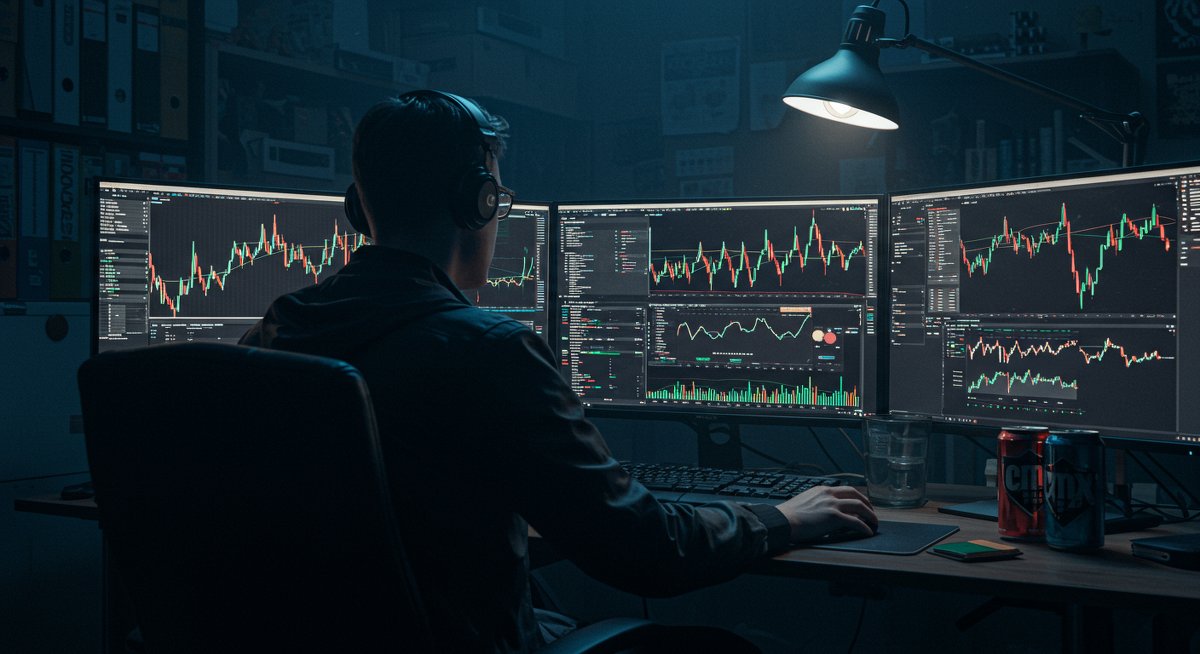That Reddit Post That Made Me Think
So, I was browsing r/Bitcoin the other day and saw this post that immediately grabbed my attention. A user was talking about charting the S&P 500 against the US M2 money supply, and their conclusion was pretty stark: even after 25 years in the market, you might still be poorer in real terms than you were a quarter-century ago. Their question, “What am I missing?” really resonated with me because it’s a question we should all be asking, especially in the crypto world. We often hear about Bitcoin as an inflation hedge, but is that always the case? This post made me want to dig deeper, and I figured it would be useful to share my thoughts with other international crypto traders who might be grappling with the same questions.
The original poster (OP) essentially highlighted a scenario where traditional market investments failed to outpace the rate at which money was being printed. This suggests that simply holding assets that appreciate in nominal value isn't enough; you need to beat inflation to maintain or increase your real purchasing power. For those of us involved in Bitcoin trading, this raises some crucial questions about its effectiveness as an inflation hedge, especially when viewed through a global lens. Different countries experience inflation differently, and the impact of monetary policy varies significantly. What works in the US might not work in Europe, Asia, or South America.

Unpacking the S&P 500 vs. Money Supply Dilemma
Let’s break down what the Reddit OP was getting at. The S&P 500 is often seen as a benchmark for market performance, but its returns aren't always adjusted for inflation. The M2 money supply, on the other hand, is a measure of the total money supply in an economy, including cash, checking deposits, and easily convertible near money. When the money supply increases faster than the growth of goods and services, inflation occurs. The OP's point was that if your investments in the S&P 500 didn't outpace the growth of the M2 money supply over 25 years, you effectively lost purchasing power. It’s a sobering thought.
Now, here's the thing. Cherry-picking dates can skew the results, as the OP admitted. But even if the specific 25-year period is an outlier, the underlying principle remains valid: you need to consider inflation-adjusted returns. This is where Bitcoin enters the picture. Proponents argue that Bitcoin's limited supply (21 million coins) makes it a hedge against inflation, as its value should theoretically increase as fiat currencies are devalued through money printing. However, Bitcoin's price volatility complicates this narrative. While it has the potential for significant gains, it also carries the risk of substantial losses, especially in the short term. For an international trader, this volatility presents both opportunities and challenges.
What This Means for Your Bitcoin Trading Strategy
So, what does all this mean for your Bitcoin trading strategy, especially if you're trading from outside the US? First, it's a reminder that simply buying and holding Bitcoin isn't a guaranteed path to wealth preservation. You need to actively manage your portfolio and consider various factors, including inflation rates in your country, exchange rates, and local regulations. For example, if you're based in a country with high inflation, holding Bitcoin might offer a better hedge than holding your local currency. However, you also need to factor in the tax implications of trading Bitcoin in your jurisdiction.
Second, it highlights the importance of diversification. Don't put all your eggs in one basket, even if that basket is Bitcoin. Consider diversifying your portfolio with other assets, such as stocks, bonds, and real estate. This can help mitigate risk and improve your overall returns. For international traders, diversifying across different markets and asset classes can be particularly beneficial, as it reduces your exposure to local economic conditions and political risks. Think about allocating a portion of your portfolio to stablecoins pegged to different fiat currencies. This can provide a hedge against currency fluctuations and inflation in specific regions. Platforms like KuCoin offer a wide range of trading pairs and financial products that can help you diversify your portfolio.
The Stuff Nobody Likes to Talk About: Risk Management
Let’s be real: nobody likes talking about risk management, but it’s crucial, especially in the volatile world of crypto. Bitcoin's price can swing wildly, and you need to be prepared for potential losses. This means setting stop-loss orders, managing your leverage, and avoiding emotional trading decisions. It also means understanding the risks associated with different trading platforms and strategies. Not all exchanges are created equal, and some may be more vulnerable to hacks or scams than others. Do your research and choose reputable platforms with strong security measures.
Beyond the price volatility, there are other risks to consider. Regulatory changes can significantly impact the value of Bitcoin and other cryptocurrencies. Governments around the world are still grappling with how to regulate crypto, and new laws could be introduced that affect your ability to trade or hold Bitcoin. Tax regulations are another area of concern. Crypto taxes can be complex, and it's essential to comply with the laws in your jurisdiction to avoid penalties. Consider consulting with a tax professional who specializes in cryptocurrency to ensure you're meeting your obligations. Given that regulations are constantly in flux, staying informed and adaptable is crucial for managing risk effectively.
If You're Trading from Outside the US: A Global Perspective
If you're trading Bitcoin from outside the US, there are some additional factors to consider. Exchange rates can significantly impact your returns, especially if you're trading between Bitcoin and your local currency. Keep an eye on currency fluctuations and consider using hedging strategies to mitigate this risk. Also, be aware of any restrictions on cross-border transactions or capital controls in your country. Some countries have strict regulations on the amount of money you can transfer in or out of the country, and these restrictions could affect your ability to trade Bitcoin.
Moreover, the availability of Bitcoin and other cryptocurrencies may vary depending on where you live. Not all exchanges operate in every country, and some platforms may have restrictions on who can use their services. Check the regulations in your jurisdiction to ensure you're trading legally. You should also research the local crypto community and see what resources are available to you. Connecting with other traders in your area can provide valuable insights and support. Depending on where you live, you might find meetups, online forums, or other communities dedicated to Bitcoin and cryptocurrency trading. These networks can be invaluable for sharing information, learning from others' experiences, and staying up-to-date on local developments.

Actually Doing This Stuff: Practical Steps
Okay, so how do you actually put all of this into practice? First, start by assessing your risk tolerance and financial goals. How much money are you willing to lose? What are you hoping to achieve with your Bitcoin investments? Once you have a clear understanding of your goals and risk tolerance, you can start developing a trading strategy. This strategy should include specific entry and exit points, as well as risk management rules.
Next, choose a reputable exchange that operates in your jurisdiction. Consider factors such as security, fees, and the availability of trading pairs. Once you've chosen an exchange, you can fund your account and start trading. Remember to use stop-loss orders to limit your potential losses and avoid emotional trading decisions. It's also a good idea to track your trades and analyze your performance. This will help you identify areas where you can improve your strategy. Platforms like Changelly are great for beginners looking for an easy on-ramp to buying and trading Bitcoin.
My Take on All This: A Balanced View
Here’s what I think: Bitcoin has the potential to be a valuable asset in a diversified portfolio, but it’s not a magic bullet. It's not a guaranteed inflation hedge, and it's not a get-rich-quick scheme. It's a complex and volatile asset that requires careful management and a solid understanding of the risks involved. The Reddit post that sparked this whole discussion was a good reminder that we should always be questioning our assumptions and doing our own research. Don't just blindly follow the hype; take the time to understand the underlying dynamics of the market and develop a strategy that works for you.
Ultimately, successful Bitcoin trading is about more than just buying low and selling high. It's about understanding the global economic landscape, managing risk effectively, and staying informed about the latest developments in the crypto world. It’s also about being adaptable and willing to change your strategy as market conditions evolve. I am not saying Bitcoin is bad or good, but I am saying you should always look at your investments with scrutiny. Do they make sense? Are they performing how you want them to perform? Investing isn't just buying an asset, but continually checking on that asset.